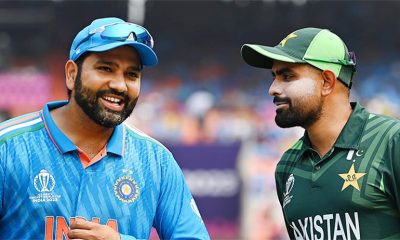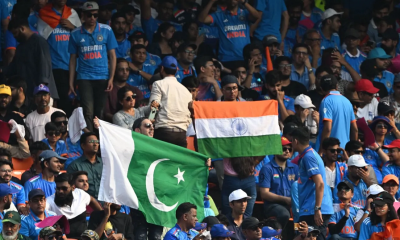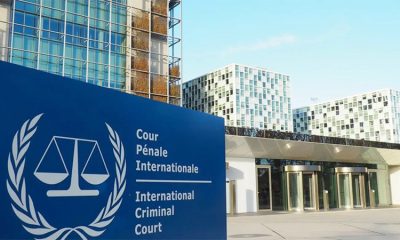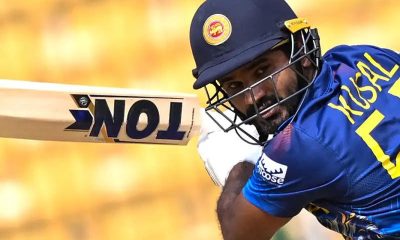Features
Anti-corruption poster boy throws down gauntlet
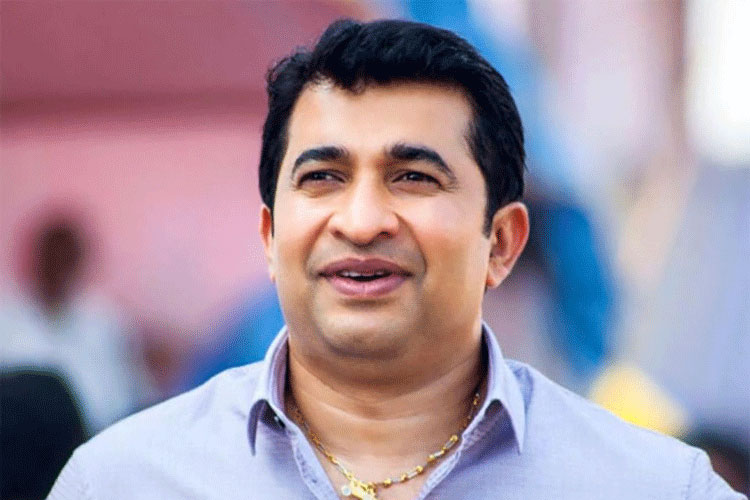
Interview with Roshan Ranasinghe:
… vows to mobilise masses to oust corrupt govt. leaders
by Saman Indrajith
Roshan Ranasinghe needs no introduction. As the Minister of Sports, he plucked up the courage to take on the politically-backed powerful cricket Mafia with international links, only to be hounded out of his ministerial post. The dark forces responsible for his ouster from the Cabinet may have thought they would be able to silence him, but he has proved that he is made of sterner stuff. He has emerged stronger, and is working hard to mobilise the public against the corrupt government leaders and their cronies.
Ranasinghe has launched an anti-corruption movement with a political goal—the Stop Corruption, Build Motherland (SCBM) alliance––and invited all those who want Sri Lanka to be rid of corruption to sink their political differences and join forces to achieve national progress.
What made Ranasinghe to pit himself against the cricket Mafia and what are his future plans? The Island met him recently. Excerpts of our freewheeling interview with him:
Q: Tell us about your background?
I am Ranasinghe Arachchige Roshan Anuruddha. My father’s family, hailing from the South, settled down in Nugawela, Kandy. My paternal grandfather had a home in Harispaththuwa and my paternal grandmother was from Kumbukgete, Kurunegala. My father was the only child in his family. My mother’s father was from Weligama. As such, I have roots in four districts!
Both my maternal and paternal families were staunch UNP supporters. They backed D. S. Senanayake and his vision. My father was close to the late Mr. Gamini Dissanayake. As a result of his politics, we lost our house. My mother had the courage to start life anew from scratch. She worked hard to improve our situation. My sister became a doctor and my two brothers took to accountancy. As soon as I completed my GCE A/L, I wanted to go to Japan.
My brothers were in France at that time. They advised me to visit them first and obtain a resident visa there. In France, I pursued my education, but I couldn’t complete it because I was determined to fulfill my dream of going to Japan. Initially, I went to Japan with a tourist visa. I travelled to many places in Japan and observed the situation in each place. Later, I went to Japan again on a student visa, and studied and worked part-time. I obtained a Diploma in Business Administration and Automobiles. I believe I learned more from Japanese society than from the theories taught in class. That education has served me well in my career as a businessman in several countries and also stood me in good stead in my political activities.
In 1996, my mother passed away, at the age of 49. I was 20 at the time, and her death was a great loss to me. After some time, I met a Sri Lankan girl in Japan. Our friendship developed into a relationship, and she is now my wife. We got married in 1999. Her name is Prashanthi Dinusha Ranasinghe, and she is a lawyer. She has been my strongest support, helping me build my businesses and supporting me in my political endeavours. I have attended four schools: Rajangana Maha Vidyalaya because our businesses were in Rajanganaya, Vidyartha College Kandy, Thambuttegama Central College, and Polonnaruwa Royal College.
Q: What kind of business are you engaged in?
I established my businesses in Japan, the UK, Mozambique, South Africa, and Sri Lanka. In these five countries, I import and sell vehicles, automobile spare parts, and high-end wrist-watches.
Q: When did you take to active politics?
I began my political career in 2009 after receiving invitations from both Ranil Wickremesinghe and Mahinda Rajapaksa. Upon receiving Wickremesinghe’s invitation, I expressed my willingness to contest from Polonnaruwa. He assured me of that opportunity. Later, I received another invitation from Mahinda Rajapaksa. I informed him that I had already given my word to Wickremesinghe and would contest from Polonnaruwa.
Subsequently, Wickremesinghe informed me that Earl Gunasekera did not want me to contest from Polonnaruwa and suggested I contest from Laggala instead. I insisted that I be allowed to contest from Polonnaruwa, and informed Wickremesinghe of Rajapaksa’s offer to contest under the UPFA ticket from the same district. Wickremesinghe wished me good luck, and I joined the UPFA as a district organizer for Polonnaruwa. Other candidates in the same team were electoral organizers who had already secured 40,000 preferential votes, while I had none. Some encouraged me, while others discouraged me.
I was elected with the highest number of preferential votes in the district. Maithripala Sirisena was the district leader, and I respected his leadership while focusing on my responsibilities. Over the next three years, I received no assistance from the party to develop the district. Basil Rajapaksa informed me that he couldn’t allocate funds due to opposition from Maithripala Sirisena. But with the assistance of well-wishers and friends, I did everything possible to serve the people of Polonnaruwa. We constructed roads, generated employment opportunities for the unemployed, and introduced technology to Polonnaruwa.
Q: What made the relationship between you and Maithripala Sirisena turn sour?
When Maithripala Sirisena left the SLFP, he carried with him all the grassroots organizations of the party in Polonnaruwa. Siripala Gamlath and Chandrasiri Sooriyiarachchi remained silent. I was tasked with organizing the presidential campaign in the Polonnaruwa District, which presented one of the biggest challenges I’ve ever faced as a district leader. I was pitted against heavyweight Maithripala Sirisena in that district. However, I enabled the party to perform better in Polonnaruwa than in the Hambantota District. Rajapaksa, as the presidential candidate, secured over 70 percent of the total district votes in his home district, Hambantota, but due to our efforts, Sirisena could poll only 55% of the votes in his home district, Polonnaruwa.
After his victory, Sirisena invited me for talks and had others file a case against me in the High Court of Polonnaruwa, accusing me of attempted murder. As the case is pending, I won’t discuss it further.
During our talks, Sirisena asked whether I would join him and go to heaven or remained loyal to Mahinda Rajapaksa and go to hell. He suggested that if I joined him, the case against me would be dropped, and he would instruct all grassroots party leaders to work with me. However, I told him that there were policy differences that prevented me from joining him.
In the 2018 local government elections, I was put in charge of the SLPP’s Polonnaruwa District campaign. It pitted myself against President Sirisena. Despite his executive powers and support from the then Prime Minister Ranil Wickremesinghe, the people voted for us. We defeated both the UNP and the SLFP.
Q: Don’t you think the Rajapaksas used you and let you down?
I have remained undefeated in elections, and after the SLPP’s victory at the 2020 general election, Mahinda Rajapaksa and Gotabaya Rajapaksa came to Polonnaruwa and said that I would be given a Cabinet portfolio so that I could launch some development projects in the district. However, I was given a State Minister post. I was tasked with helping young entrepreneurs. While I was progressing in that project, I was shifted to the Provincial Councils and Local Government State Ministry.
During the pandemic, I worked with all 330 councils. When the farmers’ crisis came up, I was appointed Mahaweli State Minister. Likewise, I was given three different state ministries within that short period of time. When the fertiliser crisis cropped up, I resigned not only from the ministerial posts but also from the Pohottuwa District leadership. Thereafter, I remained an independent MP. We witnessed massive opposition against those who remained in ministerial posts of the Pohottuwa government.
Then came the Aragalaya protests. President Wickremesinghe invited me to accept responsibilities to work with him and offered four powerful ministries – Sports, Youth Affairs, Mahaweli, and Irrigation. None of those ministries had funds at the time I accepted them. I had been handling the affairs of these ministries successfully when I was shown the door for trying to rid cricket administration of corruption.
Q: Some sports bodies faced bans under your watch. Why?
Rugby was already facing a ban when I assumed duties as the Sports Minister. There was a problem between the Rugby Chairman and the Asian Council. The latter did not recognize the former, so they banned Sri Lankan Rugby. The Chairman was adamant about staying in his post. I requested him to resign for the sake of the country because the Asian Council was ready to lift the ban if he stepped down.
I had to appoint an interim body to control the game. The Chairman then went to courts, where he later expressed his willingness to resign. With his resignation, the Asian Council lifted the ban.
Q: What about the ban on the Football Association?
The football administration is a metaphor for corruption. FIFA had been asking for reforms to the Football Association’s constitution since 2014. Their main demand was to remove football administration from the current national sports law and grant it autonomy. As their demands were not met, FIFA banned Sri Lanka.
I met FIFA General Secretary Fatma Samoura and explained the situation. They agreed to change their stance to allow the football governing body to operate within the framework of national sports laws. They gave us four years to implement this. They wanted us to make it mandatory for football officials to retire at the age of 70. I myself would retire from politics when I reach 65 years. We must let the youth come up.
Q: Your efforts to cleanse the cricket administration backfired. How would you look back at what happened?
Regarding cricket control, the entire nation knows the truth. The ICC ban on Sri Lanka cricket was orchestrated. It was officials who got the ban imposed, and it was they who got it lifted.
I have no problem with J. Sha. He is a citizen of another country. Sha was used as a shield by Sri Lanka Cricket officials, who were exposed for corruption by the Auditor General. He was misused. I was against it. When I assumed the office, I told those officials that I would not mind what happened in the past and they must be ready to work without any such deals hereafter. In that context, we won a one-day series against Australia, a test series against Pakistan, and we won the Asian Cup. Thereafter, those officials got close to the President, and had me ousted. Sri Lanka’s cricket has been the loser.
Q: You say you are a campaigner against corruption. We have had several Bodhisatvas recently in this country. Aren’t you playing the role of messiah against corruption to further self-interest in politics? When you joined hands with the Rajapaksas, you knew they were corrupt. How would you reconcile your battle against corruption and your association with the Rajapaksas in the past?
I never whitewashed the Rajapaksas. I had no such need. I needed to start somewhere when I decided to take to politics and at that time the Rajapaksas had popular support. Even the JVP supported Mahinda Rajapaksa in 2005. I believe they did so with good intentions, just as I did. We thought that they would do something for the country.
Q: But you continued to back the Rajapaksas even after they were exposed for corruption and various other malpractices. You did not leave them in 2015, when some SLFP stalwarts decamp. What would you say to this?
In 2015, there were some issues, such as nepotism and corruption. But we had to remain there because the alternative to the Rajapaksas was a messy alliance forged by Sirisena and Wickremesinghe. We feared that a country would be plunged into anarchy. We hoped that the Rajapaksas would mend their ways by the end of the Yahapalana government, which was responsible for the Treasury bond scams and failure to prevent the Easter Sunday terror attacks.
While we were planning to bring Gotabaya to power, nobody thought that he would promote family rule. But when we realized that we had made a mistake, we distanced ourselves from the government.
What we need is a righteous leader instead of a person who promotes family bandyism, protects corrupt officials, and indulges in corruption. We have become a bankrupt nation. We are against corruption. Talking about rebuilding this nation without putting an end to corruption is only a pipedream.
Q: You have launched a political movement to eliminate corruption. How would you describe it?
We are forming an alliance under the theme, ‘Let’s put an end to corruption to build our nation.’
There is a pressing need for a formidable force against corruption. We cannot think of a better future unless we go all out to get rid of corruption.
I will give you one example: when I assumed the Ministry of Sports, it did not have money. The country was bankrupt, and the government’s allocation barely sufficed to pay salaries. We ran the Ministry with funds from sponsorships. Nevertheless, during my tenure, this country won the highest number of international medals. Under the watch of SB Dissanayake, the country secured 58 international medals and that was the time when the Sports Ministry had enough funds. I inherited the same Ministry full of crises, and stopped corruption, and the result was really impressive; the country bagged 170 medals in international games.
This shows that when corruption is eliminated, progress follows.
Q: How do you propose to battle corruption and enlist popular support for that endeavour?
We have formed an alliance against corruption and rebuilding the nation. There are many individuals against corruption across the political spectrum, including politicians representing Parliament, as well as those outside Parliament. Anyone who is against corruption and has not engaged in any corrupt activities, can join this alliance.
We have appointed a committee to identify the corrupt, starting with the MPs. Sri Lanka Cricket officials have been exposed by the Auditor General for their corrupt deals, but there are still some MPs who unashamedly support those corrupt elements. They have direct links with the corrupt.
Under the anti-corruption committee, there will be sub-committees tasked with ascertaining the views of the public about corruption and how to battle it.We have a retired Supreme Court Judge, a retired High Court Judge, three lawyers, doctors, engineers, economists, and auditors on the steering committee. They work on a voluntary basis. I will not name them for obvious reasons.
Q: Does it mean that this committee will name the clean politicians and will label the rest as corrupt? How practical is that?
The committee will clear the names, and after that, we will extend invitations. It is up to each of those MPs with clear profiles to either join us or not.
Q: Aren’t you planning to turn the anti-corruption movement into a political force?
To eliminate corruption, we need state power, which we can achieve only by winning elections. We will have to form a party so that people against corruption can vote for it and make a contribution towards ridding the country of corruption.
There is no alternative. This country is in crisis. Our economy has collapsed. The crisis has not prevented the ruling party politicians from enriching themselves at the expense of the public. We must change this system and for that purpose we need power.
Q: The country already has about 80 political parties. Won’t the party you are planning to form end up being another name board?
The main parties are facing disintegration. The SLFP, the SLPP and the UNP are faction ridden. Sri Lankans have realized the need for a change. There is space for a new political force on a mission to eliminate corruption.
Q: Many have predicted that there would be a hung Parliament after the next general election. Supposing your party, which is to be formed, will obtain a substantial number of seats, will it join forces with one or some of the parties that you consider corrupt?
No, that will never happen. Never will we join hands with the corrupt. I believe that the existing political culture has to be changed. Even if we are in the Opposition, we must support a government when it does something right. We must do away with our traditional political approach where the Opposition is always expected to stand against whatever the government does, whether it is right or wrong.
SJB MP Imtiaz Bakeer Markar recently proposed that we allocate 25 percent of seats to young MPs. It is a good proposal, and I agreed with him. During the Sri Lanka Cricket issue, Opposition Leader Sajith Premadasa stood by me, and he did it for the sake of the country. We should appreciate his stance.
Q: Many youths have left the country, and some others are planning to migrate. This will adversely impact the country’s development efforts and future. What plans do your movement have to address this problem?
Most of those who are migrating are from the SME sector, which collapsed because of loans. We asked other nations to reschedule the loans we had taken. The government got local banks to reschedule the loans they had given to the government. But nothing was done to reschedule the loans obtained by the SMEs.
The government is not there to construct culverts and gutters. The government is there to protect people in crisis. Those in the SME sector spent their 24 hours thinking about how to pay back the loans. They have no time to think about how to develop their enterprises. Sri Lanka has received USD 400 million from the Asian Development Bank, USD 300 million from the World Bank, besides IMF assistance.
These funds must be utilized to develop entrepreneurs. Concessions should be given to entrepreneurs. Just because we ask, the youth would not stop leaving the country. We must unveil a plan to ensure a secure future for them. The youth are more conscious of their rights and freedoms and more averse to corruption than others. That is why they took to the streets. If we can convince them that the country will be rid of corruption and a viable programme is underway to develop the economy and improve the people’s lot, they will not leave this country. That is what we are striving to do.
Features
The heart-friendly health minister

by Dr Gotabhya Ranasinghe
Senior Consultant Cardiologist
National Hospital Sri Lanka
When we sought a meeting with Hon Dr. Ramesh Pathirana, Minister of Health, he graciously cleared his busy schedule to accommodate us. Renowned for his attentive listening and deep understanding, Minister Pathirana is dedicated to advancing the health sector. His openness and transparency exemplify the qualities of an exemplary politician and minister.
Dr. Palitha Mahipala, the current Health Secretary, demonstrates both commendable enthusiasm and unwavering support. This combination of attributes makes him a highly compatible colleague for the esteemed Minister of Health.
Our discussion centered on a project that has been in the works for the past 30 years, one that no other minister had managed to advance.
Minister Pathirana, however, recognized the project’s significance and its potential to revolutionize care for heart patients.
The project involves the construction of a state-of-the-art facility at the premises of the National Hospital Colombo. The project’s location within the premises of the National Hospital underscores its importance and relevance to the healthcare infrastructure of the nation.
This facility will include a cardiology building and a tertiary care center, equipped with the latest technology to handle and treat all types of heart-related conditions and surgeries.
Securing funding was a major milestone for this initiative. Minister Pathirana successfully obtained approval for a $40 billion loan from the Asian Development Bank. With the funding in place, the foundation stone is scheduled to be laid in September this year, and construction will begin in January 2025.
This project guarantees a consistent and uninterrupted supply of stents and related medications for heart patients. As a result, patients will have timely access to essential medical supplies during their treatment and recovery. By securing these critical resources, the project aims to enhance patient outcomes, minimize treatment delays, and maintain the highest standards of cardiac care.
Upon its fruition, this monumental building will serve as a beacon of hope and healing, symbolizing the unwavering dedication to improving patient outcomes and fostering a healthier society.We anticipate a future marked by significant progress and positive outcomes in Sri Lanka’s cardiovascular treatment landscape within the foreseeable timeframe.
Features
A LOVING TRIBUTE TO JESUIT FR. ALOYSIUS PIERIS ON HIS 90th BIRTHDAY

by Fr. Emmanuel Fernando, OMI
Jesuit Fr. Aloysius Pieris (affectionately called Fr. Aloy) celebrated his 90th birthday on April 9, 2024 and I, as the editor of our Oblate Journal, THE MISSIONARY OBLATE had gone to press by that time. Immediately I decided to publish an article, appreciating the untiring selfless services he continues to offer for inter-Faith dialogue, the renewal of the Catholic Church, his concern for the poor and the suffering Sri Lankan masses and to me, the present writer.
It was in 1988, when I was appointed Director of the Oblate Scholastics at Ampitiya by the then Oblate Provincial Fr. Anselm Silva, that I came to know Fr. Aloy more closely. Knowing well his expertise in matters spiritual, theological, Indological and pastoral, and with the collaborative spirit of my companion-formators, our Oblate Scholastics were sent to Tulana, the Research and Encounter Centre, Kelaniya, of which he is the Founder-Director, for ‘exposure-programmes’ on matters spiritual, biblical, theological and pastoral. Some of these dimensions according to my view and that of my companion-formators, were not available at the National Seminary, Ampitiya.
Ever since that time, our Oblate formators/ accompaniers at the Oblate Scholasticate, Ampitiya , have continued to send our Oblate Scholastics to Tulana Centre for deepening their insights and convictions regarding matters needed to serve the people in today’s context. Fr. Aloy also had tried very enthusiastically with the Oblate team headed by Frs. Oswald Firth and Clement Waidyasekara to begin a Theologate, directed by the Religious Congregations in Sri Lanka, for the contextual formation/ accompaniment of their members. It should very well be a desired goal of the Leaders / Provincials of the Religious Congregations.
Besides being a formator/accompanier at the Oblate Scholasticate, I was entrusted also with the task of editing and publishing our Oblate journal, ‘The Missionary Oblate’. To maintain the quality of the journal I continue to depend on Fr. Aloy for his thought-provoking and stimulating articles on Biblical Spirituality, Biblical Theology and Ecclesiology. I am very grateful to him for his generous assistance. Of late, his writings on renewal of the Church, initiated by Pope St. John XX111 and continued by Pope Francis through the Synodal path, published in our Oblate journal, enable our readers to focus their attention also on the needed renewal in the Catholic Church in Sri Lanka. Fr. Aloy appreciated very much the Synodal path adopted by the Jesuit Pope Francis for the renewal of the Church, rooted very much on prayerful discernment. In my Religious and presbyteral life, Fr.Aloy continues to be my spiritual animator / guide and ongoing formator / acccompanier.
Fr. Aloysius Pieris, BA Hons (Lond), LPh (SHC, India), STL (PFT, Naples), PhD (SLU/VC), ThD (Tilburg), D.Ltt (KU), has been one of the eminent Asian theologians well recognized internationally and one who has lectured and held visiting chairs in many universities both in the West and in the East. Many members of Religious Congregations from Asian countries have benefited from his lectures and guidance in the East Asian Pastoral Institute (EAPI) in Manila, Philippines. He had been a Theologian consulted by the Federation of Asian Bishops’ Conferences for many years. During his professorship at the Gregorian University in Rome, he was called to be a member of a special group of advisers on other religions consulted by Pope Paul VI.
Fr. Aloy is the author of more than 30 books and well over 500 Research Papers. Some of his books and articles have been translated and published in several countries. Among those books, one can find the following: 1) The Genesis of an Asian Theology of Liberation (An Autobiographical Excursus on the Art of Theologising in Asia, 2) An Asian Theology of Liberation, 3) Providential Timeliness of Vatican 11 (a long-overdue halt to a scandalous millennium, 4) Give Vatican 11 a chance, 5) Leadership in the Church, 6) Relishing our faith in working for justice (Themes for study and discussion), 7) A Message meant mainly, not exclusively for Jesuits (Background information necessary for helping Francis renew the Church), 8) Lent in Lanka (Reflections and Resolutions, 9) Love meets wisdom (A Christian Experience of Buddhism, 10) Fire and Water 11) God’s Reign for God’s poor, 12) Our Unhiddden Agenda (How we Jesuits work, pray and form our men). He is also the Editor of two journals, Vagdevi, Journal of Religious Reflection and Dialogue, New Series.
Fr. Aloy has a BA in Pali and Sanskrit from the University of London and a Ph.D in Buddhist Philosophy from the University of Sri Lankan, Vidyodaya Campus. On Nov. 23, 2019, he was awarded the prestigious honorary Doctorate of Literature (D.Litt) by the Chancellor of the University of Kelaniya, the Most Venerable Welamitiyawe Dharmakirthi Sri Kusala Dhamma Thera.
Fr. Aloy continues to be a promoter of Gospel values and virtues. Justice as a constitutive dimension of love and social concern for the downtrodden masses are very much noted in his life and work. He had very much appreciated the commitment of the late Fr. Joseph (Joe) Fernando, the National Director of the Social and Economic Centre (SEDEC) for the poor.
In Sri Lanka, a few religious Congregations – the Good Shepherd Sisters, the Christian Brothers, the Marist Brothers and the Oblates – have invited him to animate their members especially during their Provincial Congresses, Chapters and International Conferences. The mainline Christian Churches also have sought his advice and followed his seminars. I, for one, regret very much, that the Sri Lankan authorities of the Catholic Church –today’s Hierarchy—- have not sought Fr.
Aloy’s expertise for the renewal of the Catholic Church in Sri Lanka and thus have not benefited from the immense store of wisdom and insight that he can offer to our local Church while the Sri Lankan bishops who governed the Catholic church in the immediate aftermath of the Second Vatican Council (Edmund Fernando OMI, Anthony de Saram, Leo Nanayakkara OSB, Frank Marcus Fernando, Paul Perera,) visited him and consulted him on many matters. Among the Tamil Bishops, Bishop Rayappu Joseph was keeping close contact with him and Bishop J. Deogupillai hosted him and his team visiting him after the horrible Black July massacre of Tamils.
Features
A fairy tale, success or debacle

Sri Lanka-Singapore Free Trade Agreement
By Gomi Senadhira
senadhiragomi@gmail.com
“You might tell fairy tales, but the progress of a country cannot be achieved through such narratives. A country cannot be developed by making false promises. The country moved backward because of the electoral promises made by political parties throughout time. We have witnessed that the ultimate result of this is the country becoming bankrupt. Unfortunately, many segments of the population have not come to realize this yet.” – President Ranil Wickremesinghe, 2024 Budget speech
Any Sri Lankan would agree with the above words of President Wickremesinghe on the false promises our politicians and officials make and the fairy tales they narrate which bankrupted this country. So, to understand this, let’s look at one such fairy tale with lots of false promises; Ranil Wickremesinghe’s greatest achievement in the area of international trade and investment promotion during the Yahapalana period, Sri Lanka-Singapore Free Trade Agreement (SLSFTA).
It is appropriate and timely to do it now as Finance Minister Wickremesinghe has just presented to parliament a bill on the National Policy on Economic Transformation which includes the establishment of an Office for International Trade and the Sri Lanka Institute of Economics and International Trade.
Was SLSFTA a “Cleverly negotiated Free Trade Agreement” as stated by the (former) Minister of Development Strategies and International Trade Malik Samarawickrama during the Parliamentary Debate on the SLSFTA in July 2018, or a colossal blunder covered up with lies, false promises, and fairy tales? After SLSFTA was signed there were a number of fairy tales published on this agreement by the Ministry of Development Strategies and International, Institute of Policy Studies, and others.
However, for this article, I would like to limit my comments to the speech by Minister Samarawickrama during the Parliamentary Debate, and the two most important areas in the agreement which were covered up with lies, fairy tales, and false promises, namely: revenue loss for Sri Lanka and Investment from Singapore. On the other important area, “Waste products dumping” I do not want to comment here as I have written extensively on the issue.
1. The revenue loss
During the Parliamentary Debate in July 2018, Minister Samarawickrama stated “…. let me reiterate that this FTA with Singapore has been very cleverly negotiated by us…. The liberalisation programme under this FTA has been carefully designed to have the least impact on domestic industry and revenue collection. We have included all revenue sensitive items in the negative list of items which will not be subject to removal of tariff. Therefore, 97.8% revenue from Customs duty is protected. Our tariff liberalisation will take place over a period of 12-15 years! In fact, the revenue earned through tariffs on goods imported from Singapore last year was Rs. 35 billion.
The revenue loss for over the next 15 years due to the FTA is only Rs. 733 million– which when annualised, on average, is just Rs. 51 million. That is just 0.14% per year! So anyone who claims the Singapore FTA causes revenue loss to the Government cannot do basic arithmetic! Mr. Speaker, in conclusion, I call on my fellow members of this House – don’t mislead the public with baseless criticism that is not grounded in facts. Don’t look at petty politics and use these issues for your own political survival.”
I was surprised to read the minister’s speech because an article published in January 2018 in “The Straits Times“, based on information released by the Singaporean Negotiators stated, “…. With the FTA, tariff savings for Singapore exports are estimated to hit $10 million annually“.
As the annual tariff savings (that is the revenue loss for Sri Lanka) calculated by the Singaporean Negotiators, Singaporean $ 10 million (Sri Lankan rupees 1,200 million in 2018) was way above the rupees’ 733 million revenue loss for 15 years estimated by the Sri Lankan negotiators, it was clear to any observer that one of the parties to the agreement had not done the basic arithmetic!
Six years later, according to a report published by “The Morning” newspaper, speaking at the Committee on Public Finance (COPF) on 7th May 2024, Mr Samarawickrama’s chief trade negotiator K.J. Weerasinghehad had admitted “…. that forecasted revenue loss for the Government of Sri Lanka through the Singapore FTA is Rs. 450 million in 2023 and Rs. 1.3 billion in 2024.”
If these numbers are correct, as tariff liberalisation under the SLSFTA has just started, we will pass Rs 2 billion very soon. Then, the question is how Sri Lanka’s trade negotiators made such a colossal blunder. Didn’t they do their basic arithmetic? If they didn’t know how to do basic arithmetic they should have at least done their basic readings. For example, the headline of the article published in The Straits Times in January 2018 was “Singapore, Sri Lanka sign FTA, annual savings of $10m expected”.
Anyway, as Sri Lanka’s chief negotiator reiterated at the COPF meeting that “…. since 99% of the tariffs in Singapore have zero rates of duty, Sri Lanka has agreed on 80% tariff liberalisation over a period of 15 years while expecting Singapore investments to address the imbalance in trade,” let’s turn towards investment.
Investment from Singapore
In July 2018, speaking during the Parliamentary Debate on the FTA this is what Minister Malik Samarawickrama stated on investment from Singapore, “Already, thanks to this FTA, in just the past two-and-a-half months since the agreement came into effect we have received a proposal from Singapore for investment amounting to $ 14.8 billion in an oil refinery for export of petroleum products. In addition, we have proposals for a steel manufacturing plant for exports ($ 1 billion investment), flour milling plant ($ 50 million), sugar refinery ($ 200 million). This adds up to more than $ 16.05 billion in the pipeline on these projects alone.
And all of these projects will create thousands of more jobs for our people. In principle approval has already been granted by the BOI and the investors are awaiting the release of land the environmental approvals to commence the project.
I request the Opposition and those with vested interests to change their narrow-minded thinking and join us to develop our country. We must always look at what is best for the whole community, not just the few who may oppose. We owe it to our people to courageously take decisions that will change their lives for the better.”
According to the media report I quoted earlier, speaking at the Committee on Public Finance (COPF) Chief Negotiator Weerasinghe has admitted that Sri Lanka was not happy with overall Singapore investments that have come in the past few years in return for the trade liberalisation under the Singapore-Sri Lanka Free Trade Agreement. He has added that between 2021 and 2023 the total investment from Singapore had been around $162 million!
What happened to those projects worth $16 billion negotiated, thanks to the SLSFTA, in just the two-and-a-half months after the agreement came into effect and approved by the BOI? I do not know about the steel manufacturing plant for exports ($ 1 billion investment), flour milling plant ($ 50 million) and sugar refinery ($ 200 million).
However, story of the multibillion-dollar investment in the Petroleum Refinery unfolded in a manner that would qualify it as the best fairy tale with false promises presented by our politicians and the officials, prior to 2019 elections.
Though many Sri Lankans got to know, through the media which repeatedly highlighted a plethora of issues surrounding the project and the questionable credentials of the Singaporean investor, the construction work on the Mirrijiwela Oil Refinery along with the cement factory began on the24th of March 2019 with a bang and Minister Ranil Wickremesinghe and his ministers along with the foreign and local dignitaries laid the foundation stones.
That was few months before the 2019 Presidential elections. Inaugurating the construction work Prime Minister Ranil Wickremesinghe said the projects will create thousands of job opportunities in the area and surrounding districts.
The oil refinery, which was to be built over 200 acres of land, with the capacity to refine 200,000 barrels of crude oil per day, was to generate US$7 billion of exports and create 1,500 direct and 3,000 indirect jobs. The construction of the refinery was to be completed in 44 months. Four years later, in August 2023 the Cabinet of Ministers approved the proposal presented by President Ranil Wickremesinghe to cancel the agreement with the investors of the refinery as the project has not been implemented! Can they explain to the country how much money was wasted to produce that fairy tale?
It is obvious that the President, ministers, and officials had made huge blunders and had deliberately misled the public and the parliament on the revenue loss and potential investment from SLSFTA with fairy tales and false promises.
As the president himself said, a country cannot be developed by making false promises or with fairy tales and these false promises and fairy tales had bankrupted the country. “Unfortunately, many segments of the population have not come to realize this yet”.
(The writer, a specialist and an activist on trade and development issues . )






